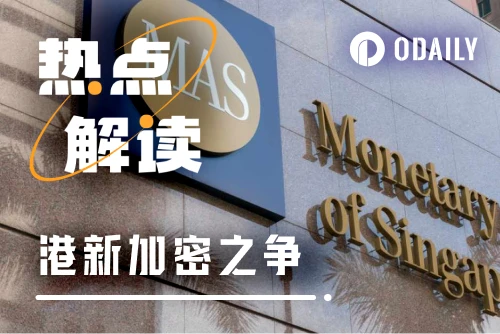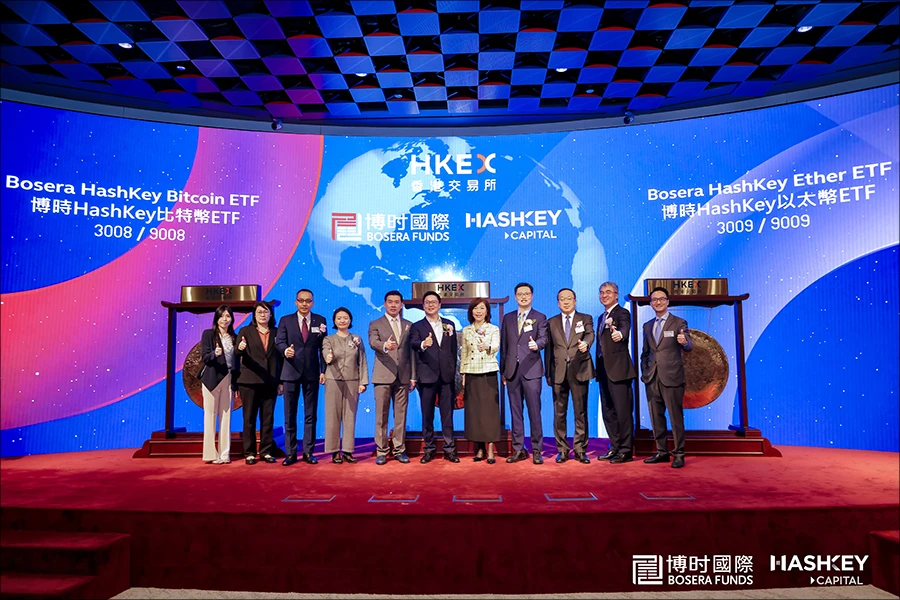Original | Odaily Planet Daily (@OdailyChina)
Author | Ethan (@ethanzhangweb3)_

Recently, a current of competition over the ownership of the "Asian crypto center" has surged again.
On May 30, the Monetary Authority of Singapore (MAS) suddenly introduced new Web3 regulations (the key points of the new regulations have been previously summarized by Odaily Planet Daily in "All unregistered crypto companies must withdraw from Singapore by the end of the month! No transition period!"), shaking the entire Southeast Asian crypto ecosystem.
On June 4, Hong Kong Legislative Council member Wu Jiezhuang spoke on X platform: "We welcome Web3 companies operating in Singapore to move to Hong Kong, and we are willing to provide policy and landing assistance." This statement serves as both a public invitation to the industry and a "relay" in the reshaping of the Web3 landscape.
Web3 has never been an exclusive game for a single region; it is a new battleground for global financial and technological competition. Singapore is reconstructing boundaries and clarifying jurisdiction under strict regulation, while Hong Kong is accelerating exploration through cautious openness. So, amidst the storm, where will be the safe haven for capital and innovation?
A "Heavy Blow" to Web3: Singapore Tightens Regulations, Causing Industry Turmoil
On May 30, the Monetary Authority of Singapore (MAS) released the DTSP new regulations (original text), requiring all institutions and individuals engaged in crypto token-related businesses to obtain a DTSP license by June 30, or cease operations. This regulation covers trading platforms, wallet service providers, DeFi protocols, NFT markets, and even KOLs publishing crypto research content. The three main regulatory characteristics summarized by the industry are: no buffer period (immediate implementation, no transition phase); full coverage (any entity providing digital asset services, regardless of registration location or operational model, is subject to regulation); zero tolerance (violations will face fines or criminal penalties).
Particularly controversial is the expanded definition of "operating location"—even those who are "working from home" in Singapore and serving overseas users are considered regulatory subjects, leaving many entrepreneurs feeling "nowhere to hide."
However, on June 6, MAS issued a supplementary clarification, adjusting the scope of policy application in an attempt to alleviate some market misunderstandings and panic _ (but to no avail, as this "clarification" did not materially relax regulatory requirements) _:
Regulation focuses on institutions that "provide digital payment tokens or capital market token services only to overseas clients"; such DTSPs must be licensed, but MAS clearly stated that "very few licenses will be issued," and most such institutions will face exit;
Projects providing governance or functional token services (such as DAO platforms, GameFi item tokens, etc.) are not included in this regulatory framework and do not need a license;
Institutions that have served clients within Singapore will continue to operate under the existing regulatory framework and will not be affected by the new regulations, allowing them to continue domestic and foreign business;
There is still no transition period; MAS emphasized that it has publicly warned about this policy direction multiple times since 2022, and only a "very small number" of institutions have been officially recognized as affected.
This clarification indicates that MAS intends to precisely target "overseas service providers" with potential cross-border money laundering risks, rather than completely shutting down the Web3 industry. However, it also sends a clear signal—after a series of credibility shocks from events like Three Arrows Capital, Hodlnaut, and FTX, Singapore's financial regulatory style is shifting from "open experimentation" to "risk prevention first." This trend may end the loose imagination of Singapore as the "Asian crypto paradise," forcing many startup projects into a dilemma of "either high compliance costs or migrating away," and signaling that Singapore's Web3 ecosystem is entering a period of compliance restructuring: resources, structures, costs, and risk models will all be redefined.
Embracing Web3: Hong Kong's Open Regulation and Policy Advantages Emerge
In stark contrast to Singapore's tightening regulations, Hong Kong is accelerating its embrace of Web3 through a more flexible compliance system.
Since the release of the "Policy Declaration on the Development of Virtual Assets" in 2022, Hong Kong has gradually implemented core systems including VATP virtual asset trading platform licenses, stablecoin regulatory regulations, and OTC compliance, providing clear expectations for the market.
According to data from the Hong Kong Securities and Futures Commission, as of now, 10 virtual asset trading platforms, including OSL Digital Securities Limited, EXIO Limited, and Hash Blockchain Limited, have obtained licenses, and retail investors are explicitly allowed to participate in trading.
Moreover, in advancing product innovations in various niche areas such as RWA (real-world asset) tokenization, virtual asset staking, and derivatives pilot projects, Hong Kong is no longer "talking the talk":
In April this year, the world's first tokenized money market ETF (a tokenization scheme for Hong Kong dollar and US dollar money market ETFs in collaboration with Bosera International and HashKey Group) was approved by the Securities and Futures Commission and launched in Hong Kong, making it the largest virtual asset ETF market in the Asia-Pacific region;

The listing ceremony for Bosera HashKey ETFs was held at the Hong Kong Stock Exchange
On May 30, the Hong Kong Special Administrative Region government published the "Stablecoin Regulation" in the Gazette, meaning that the regulation officially became law, establishing a regulatory framework for the issuance and use of stablecoins.
In terms of attracting capital and supporting entrepreneurship, Hong Kong is also increasing resource investment: for example, in enterprise introduction, since the 2022 virtual asset declaration, it has welcomed the industry to develop in Hong Kong, with informal statistics showing that over a thousand Web3 companies have settled in Hong Kong, especially with nearly 300 Web3 companies gathered in Hong Kong's Cyberport, raising over 400 million Hong Kong dollars; secondly, in terms of taxation, tax incentives are provided for eligible virtual asset trading (though not yet detailed); in terms of talent introduction, a maximum monthly subsidy of 32,000 Hong Kong dollars is offered for talent landing, along with research funding; in terms of policy, the government actively "attracts investment and intelligence," making high-profile efforts to attract companies restricted in Singapore to relocate their headquarters, etc.
Compared to Singapore's increasingly stringent environment, Hong Kong appears particularly "friendly" at this time, making it more suitable for entrepreneurs to explore the market and engage in experimental innovation.
Dream and Reality: Is Hong Kong the "New Center" or a "Transition Station"?
However, when we attempt to conclude that "Hong Kong is more welcoming to crypto entrepreneurs than Singapore," we must remain calm about the reality.
On the factual level, Hong Kong does indeed show a posture of "willing to take on more roles," but the industry is also aware that it still faces many problems and challenges: for example, while policy statements are clear, the progress of implementation remains uneven; additionally, infrastructure and supporting services are still inadequate, posing significant obstacles for startups in their early stages; and while tax policies have advantages, the regulatory details still require more clarity.
From the perspective of entrepreneurs, "migrating to Hong Kong" is not an immediate decision but rather a "suboptimal choice under no better options." Some even argue that rather than establishing a new base in Hong Kong, it might be better to turn directly to crypto-friendly regions like Dubai, where policies are more relaxed and environmental costs are lower. The crypto measures taken by South Korea's new president after taking office are also worth observing.
In other words, today's Hong Kong resembles a "relay station" following Singapore's retreat, rather than an immediate new hub with a complete ecological closed loop.
Conclusion: The Hong Kong-Singapore Rivalry is Just a Microcosm of the Asian Web3 Ecosystem
The oscillation of regulations, differences in policies, and evolution of ecosystems are all external manifestations of the competition between capital and innovation in the Web3 era.
This time, Singapore chose to "set rules," while Hong Kong chose to "attract flow." In the long run, this is not a black-and-white struggle, but a reshaping of ecological positioning: Singapore may evolve into a compliance asset management center, while Hong Kong takes on the role of a technology testing ground and Asian capital hub.
For entrepreneurs, the most important thing has never been to bet on which city, but to maintain a precise perception of policy trends, regulatory scales, and market spaces, along with the ability to respond quickly. The world of Web3 is always fluid; the real "safe haven" may not only be on the map but also in the hearts of every team making clear-headed decisions.
免责声明:本文章仅代表作者个人观点,不代表本平台的立场和观点。本文章仅供信息分享,不构成对任何人的任何投资建议。用户与作者之间的任何争议,与本平台无关。如网页中刊载的文章或图片涉及侵权,请提供相关的权利证明和身份证明发送邮件到support@aicoin.com,本平台相关工作人员将会进行核查。




